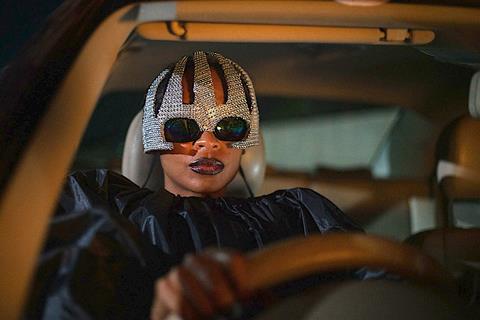A young Zambian woman confronts long-buried family secrets in Rungano Nyoni’s second feature

Dir/scr: Rungano Nyoni. Zambia/UK/Ireland. 2024. 98mins
Death is a blank slate, the sins of the deceased wiped clean. What is mourned by family and friends is a soul that is as pure as the moment that it was born. Or so the Bemba people of Zambia believe. In practice, it’s a little more complicated for Shula (Susan Chardy), recently returned to Zambia and the bosom of her family from a stint abroad, only to find herself expected to weep for a man – her late Uncle Fred – who caused her immeasurable harm. The second film from Rungano Nyoni, On Becoming A Guinea Fowl is a formally daring picture that blends fantasy, stylised drama and elements of black comedy to explore the societal pressures that rewrite the truth.
A formally daring picture that blends fantasy, stylised drama and elements of black comedy
Nyoni returns to Cannes, this time screening in Un Certain Regard, following the 2017 premiere of her debut, I Am Not A Witch, in Directors’ Fortnight. There are shared themes between the two films – the idea that ’the truth’ is sometimes just a lie that is repeated loudly and confidently – and a shared approach. Nyoni’s surrealistic flair is very much in evidence once again. The backdrop, however, differs. Rather than the impoverished tribal village of Witch, Guinea Fowl unfolds in an affluent middle-class family. Nyoni’s distinctive directorial vision and intriguingly oblique storytelling (together with the A24 muscle behind it) should make this a title of interest on the festival circuit and perhaps beyond.
It is Shula who discovers her uncle’s corpse. Driving home from a costume party, wearing a sequinned helmet and a balloon-shaped black romper suit, Shula breaks off from singing along to her radio to glance at the prone body lying in the road. It’s not surprise or grief that registers on her face, but irritation. This only deepens with the arrival of her cousin Nsansa (Elizabeth Chisela), so drunk that her words have become glued together and she has started to blur around the edges.
Thus begins the purgatorial business of getting Uncle Fred, a philandering alcoholic (and, it turns out, much worse) who died suspiciously close to the local brothel, mourned and buried. Shula initially tries to extricate herself from the circus of performative grief – she checks into a hotel where she tries to work remotely. But her aunties, a Greek chorus designed to draw attention to failures in familial duty within the younger generation, burst into her room and interrogate her over her conspicuous lack of sadness. Shula’s role, the aunties tell her, is to support her mother, Fred’s sister, at this time.
Dutifully, Shula drives to the airport to pick up her mother, who duly prostrates herself on the floor of the arrivals lounge in an extravagant display of paralysing sadness, before joining in the collective wailing. They mourn Fred as if he were a saint, cackles Nsansa, rather than “a pervert”. Although they have little else in common, both Shula and Nsansa know from experience what Fred was capable of. What they don’t initially realise, holed up in the pantry to escape from the funeral, is the extent of Fred’s crimes.
And here’s the rub: secrecy surrounded Fred, an abuser who preyed on the girls in the family. But his crimes were not secrets. On the contrary, it seems as though everybody in the extended family knew at least some of it, but collectively acted to cover up for him. The film is very specific in its Zambian setting, but this theme is universal – there are parallels with Mira Nair’s Monsoon Wedding and Thomas Vinterberg’s Festen, to name just two.
Largely playing out in crowded interior spaces, the film, guided by David Gallego’s inquisitive lens, is attuned to the mercurial dynamics between characters. Yet lighting these spaces seems to have proved a challenge, with some of the drama muted by the murkiness of the photography.
Where the film does impress is in the effortless segues between fantasy and reality – Shula sees her own younger self, staring back at her accusingly; she sees tides of floodwater claiming rooms. She remembers an educational children’s TV show, titled ’Farm Club’, that tells viewers about the role of the Guinea Fowl. And she sees herself in this small but noisy bird: a warning system, alerting the world around it to danger.
Production companies: Element Pictures, BBC Films, Fremantle, A24
International sales: A24 international@a24films.com
Producers: Tim Cole, Ed Guiney, Andrew Lowe
Cinematography: David Gallego
Production design: Malin Lindholm
Editing: Nathan Nugent
Music: Lucrecia Dalt
Main cast: Susan Chardy, Elizabeth Chisela, Henry B.J. Phiri, Roy Chisha, Benson Mumba






![The Brightest SunScreen[Courtesy HKIFF]](https://d1nslcd7m2225b.cloudfront.net/Pictures/274x183/3/5/0/1448350_thebrightestsunscreencourtesyhkiff_312678.jpg)















![The Brightest SunScreen[Courtesy HKIFF]](https://d1nslcd7m2225b.cloudfront.net/Pictures/100x67/3/5/0/1448350_thebrightestsunscreencourtesyhkiff_312678.jpg)

